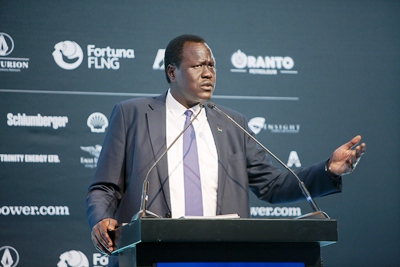S. Sudan energy conference attracts over 400 delegates
October 16, 2017 (JUBA) – About 400 delegates attended South Sudan’s just-concluded first-ever energy and infrastructure, which aimed at attracting investment into oil, gas, power sectors as well as supporting infrastructure.

The conference, endorsed by the Ministry of Petroleum and organized by Africa Oil and Power, was oversubscribed by 30%.
“We were blown away by the attendance and by the level of engagement from participants, which we believe reflects new optimism for South Sudan,” said Guillaume Doane, the CEO of Africa Oil & Power in a statement.
“This is a country with proven below-ground potential and an increasing commitment to resolving above-ground risks. The international investment community is recognizing that the market is ripe for a resurgence,” he added.
Some of the issues discussed during the South Sudan Oil & Power included enhancements to security at northern oilfields, increasing improved and enhanced oil recovery techniques at maturing fields with flagging output and securing financing for power and infrastructure. For instance, during the conference, the governments of South Sudan and Sudan met to discuss strengthening oil trade.
On the other hand, the governments of Uganda and South Sudan also discussed how to upgrade energy infrastructure in the region.
“I can’t believe what we have accomplished. With Africa Oil & Power, we have started something big,” South Sudan’s Petroleum Minister, Ezekiel Lol Gatkuoth, adding “We need to do this every year.”
South Sudan’s vice president, James Wani Igga, among other senior officials in the coalition government attended the event, which also graced by the presidents of all South Sudan’s joint operating companies, representatives from international oil companies CNPC, Petronas and Tullow Oil and ministers from Uganda as well as Sudan.
Since its independence, South Sudan has relied on oil for all income—a situation that has significantly compounded ongoing political and economic instability due to the fall in crude oil prices.
According to South Sudanese officials, however, production in the past reached as high as 350,000 bpd but fell after a dispute with Sudan over fees for pumping South Sudan’s crude through Sudan’s export pipeline, which led South Sudan to halt production in 2012.
But oil production reportedly dropped to 245,000 barrels per day after the outbreak of the civil conflict in South Sudan in December 2013, which hindered production in the oil-rich areas of the north.
(ST)
